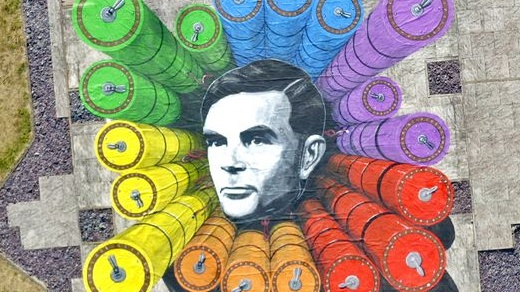Can you solve GCHQ’s LGBT-themed Alan Turing brain-teaser?
Spooks release puzzle as £50 note dedicated to the code breaker enters circulation

A free daily email with the biggest news stories of the day – and the best features from TheWeek.com
You are now subscribed
Your newsletter sign-up was successful
GCHQ has unveiled a giant mural of wartime hero Alan Turing to mark the release of the new £50 note bearing the wartime hero’s image.
The giant LGBT-themed artwork has been installed at the heart of the spy agency’s headquarters in Benhall, Cheltenham, known as “the doughnut”, and features a number of cryptic codes for viewers to decipher.
Designed in “consultation with staff from GCHQ’s Pride network”, the mural features 15 hidden codes that can “be attempted by professional and amateur sleuths alike”, The Telegraph says. But beware, breaking the codes is no easy task and requires a combination of “cryptological tools, including Morse and binary codes, anagrams, Base64 code and Braille”.
The Week
Escape your echo chamber. Get the facts behind the news, plus analysis from multiple perspectives.

Sign up for The Week's Free Newsletters
From our morning news briefing to a weekly Good News Newsletter, get the best of The Week delivered directly to your inbox.
From our morning news briefing to a weekly Good News Newsletter, get the best of The Week delivered directly to your inbox.
Installed by specialist 3D artist Joe Hill, the mural features Turing inside the “drums” from the British Bombe, the machine designed by Turing to break Enigma-enciphered messages during the Second World War .
Turing “played a pivotal role in cracking the Enigma code” while working at Bletchley Park, GCHQ’s wartime base, a breakthrough that is “thought to have shortened the Second World War by at least two years, saving millions of lives”, Sky News reports.
Used by the German army to send secure messages, it was thought that the code was “unbreakable”, the broadcaster adds. but Turing and the team of British codebreakers cracked the first messages in 1940.
“Alan Turing was a genius who helped to shorten the war and influence the technology that still shapes our lives today. He was embraced for his brilliance but persecuted for being gay”, GCHQ Director Jeremy Fleming said.
A free daily email with the biggest news stories of the day – and the best features from TheWeek.com
“Turing’s legacy reminds us every day that diversity is essential and inclusion is mission-critical to our organisation. His appearance on the £50 note is an important moment in ours and this country’s history. Turing was and remains a beacon of hope for all who dare to live and think differently.”
Turing is considered the “father of modern computing” and was also “a pioneer in artificial intelligence”, The Telegraph reports. But after the war, he was prosecuted for indecency over his relationship with another man in Manchester.
In March 1952, Turing pleaded guilty to the charge and was given the option of being jailed or serving a period of probation during which he was forced to undergo hormonal treatment intended to reduce his libido. He took his own life in June 1954.
Skylar, head of GCHQ’s Pride Network said: “Alan Turing is a role model for many here at GCHQ and a global icon as an LGBT+ person in the field of science and technology.
“Though we should never forget the tragedy of his life being cut short, we should always endeavour to learn from his legacy and create a safer and better future for LGBT+ people.”